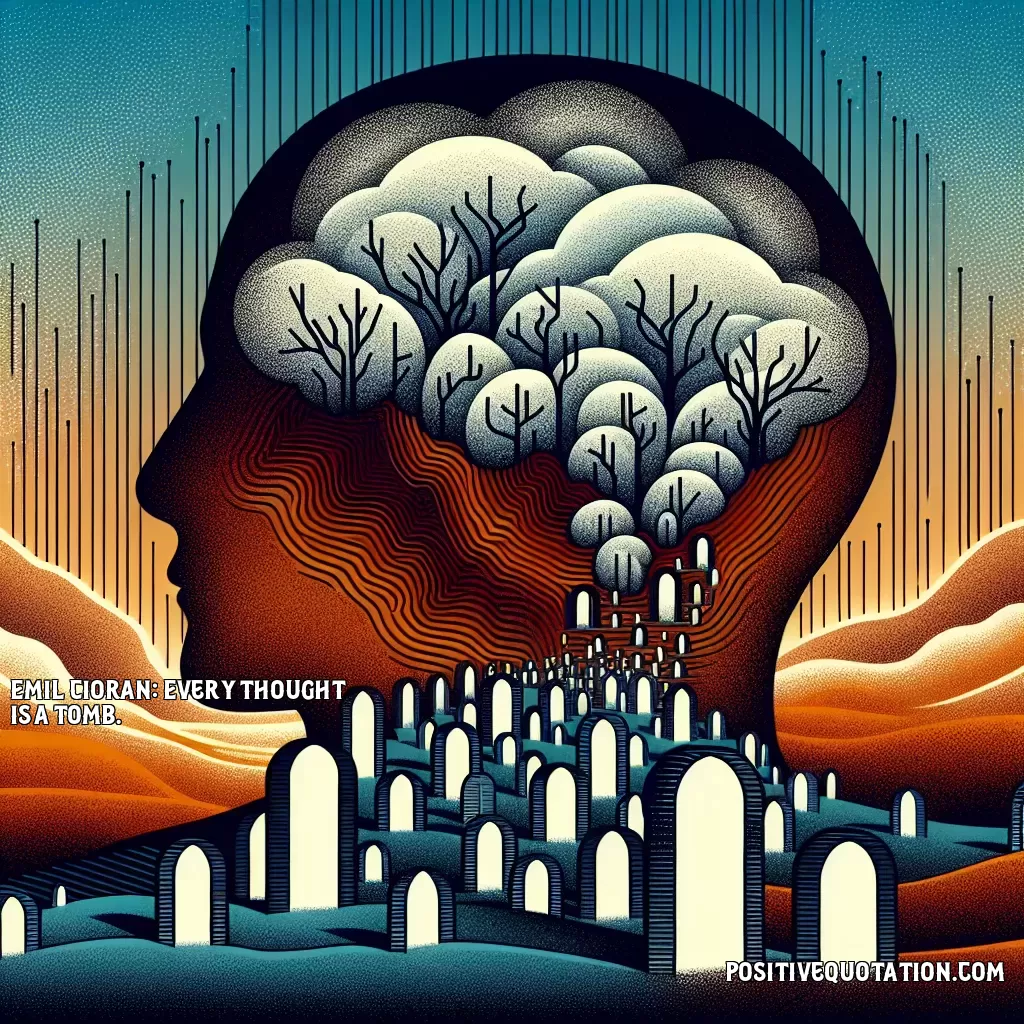
Emil Cioran: Every thought is a tomb.
Author: Emil Cioran
👁️ 12 views
Emil Cioran's quote "Every thought is a tomb" suggests a deep, philosophical reflection on the nature of human cognition and the consequences of our thoughts. At its core, this statement might be interpreted as an exploration of the relationship between thinking and existential burden. In one sense, thoughts, much like tombs, can signify endings or closures. When we formulate a thought, we are often attempting to capture and define our ever-changing perceptions and experiences. However, by doing so, we inherently impose limitations, as if encasing the fluidity of life in a static form, much like sealing something in a tomb. Moreover, Cioran may be hinting at the notion that each thought carries with it a weight or burden, similar to how a tomb is filled with the remains of something that once was vibrant and alive. In this context, thoughts can be seen as encapsulations of our past decisions, fears, and regrets. As we think, we continually shape our understanding of the world, but at the same time, we confine ourselves within those understandings, just as a tomb confines its contents. Additionally, there is a melancholic beauty associated with this statement. It implies that there is a finality to our thoughts—once conceived, they are etched into the fabric of our consciousness, unable to return to their nascent, unformed origins. Much like how a tomb marks the end of life, a thought signifies the end of possibility where pure potential has crystallized into a concrete form. In essence, Cioran's quote underscores the duality of thought: as a vessel for expression and understanding, and as a limitation that reduces the boundless potential of existence into fixed concepts and judgments.
Quote By: Emil Cioran
Emil Cioran, a Romanian philosopher and essayist, was born on April 8, 1911, in Rășinari, a small village in Transylvania. Known for his profound and often pessimistic insights into the human condition, Cioran's work traverses themes of despair, existentialism, and the absurd. His early education in Sibiu and later in Bucharest laid the foundation for his literary and philosophical pursuits. In 1937, Cioran published his first book, "On the Heights of Despair," which quickly established him as a notable voice in Romanian literature.
After moving to Paris in 1937, Cioran embraced the French language and began writing in it, ultimately becoming a significant figure in French literature. His unique style marries lyrical prose with philosophical reflection, and his works often delve into the bleakness of human existence. In the tumultuous backdrop of the 20th century, Cioran’s writings resonate with the disillusionment and uncertainty of the era. He became associated with the existentialist movement, although he often disavowed its more optimistic philosophies.
Throughout his career, Emil Cioran produced several notable works, including "The Trouble with Being Born," "A Short History of Decay," and "The temptation to exist." His writings are characterized by a deep, almost poetic exploration of themes such as suffering, mortality, and the futility of existence. Cioran’s philosophy, often steeped in nihilism, invites readers to confront the absurdity of life and the inevitability of death, prompting introspection on the nature of existence itself.
Despite his bleak outlook, Emil Cioran's influence extends beyond the confines of despair; he has inspired countless readers and thinkers with his incisive observations and stylistic brilliance. He lived in Paris until his death on June 20, 1995, leaving behind a legacy of philosophical insight that continues to captivate audiences around the world. Cioran remains a significant figure in literary and philosophical discussions, celebrated for his ability to articulate the complexities of the human experience.